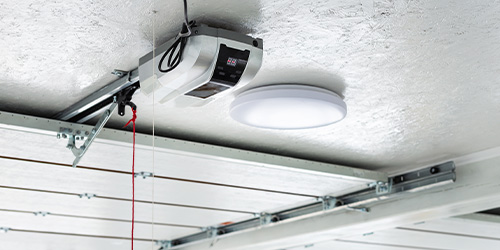6 Reasons Why Your Garage Door Isn't Closing

We’ve all been there. You’re running late for work, the kids are in the car, and just as you’re about to leave, your garage door refuses to close. You try the remote, the wall switch, and even a little manual push—nothing works.
It’s one of those frustrating moments that can ruin your day. A garage door that won’t close can feel like a massive inconvenience, but it doesn’t have to be a mystery. There are a variety of common reasons why your garage door isn’t cooperating.
Before you schedule a garage door repair appointment or you start considering installing a new garage door, let's take a look at some of the usual suspects when it comes to your garage door not closing properly!
1. Blocked Sensors
Perhaps the most common reason garage doors fail to open is when their sensors are blocked.
Here’s the lowdown on how to deal with blocked sensors:
- Why It Happens: Modern garage doors come equipped with safety sensors near the bottom of the door tracks. These sensors are designed to prevent the door from closing on objects, pets, or people. If the sensors are blocked or misaligned, they can prevent the door from closing.
- Signs to Look Out For: The door starts to close but then reverses, or the sensor lights are flashing.
- How to Resolve: Check for any objects blocking the sensors. Ensure the sensors are clean and properly aligned. If necessary, adjust them until the lights on both sensors are steady and not blinking.
2. Remote Control Issues
Sometimes, the problem with your garage door lies in the palm of your hand.
Here are a few of the reasons and solutions for garage door remote control problems:
- Why It Happens: The remote control might be out of range, have dead batteries, or experience interference from other electronic devices.
- Signs to Look Out For: The wall switch works, but the remote control doesn’t, or you have to stand very close to the door for the remote to work.
- How to Resolve: Replace the batteries in your remote control. Check for any electronic devices that might be causing interference. If the problem persists, you may need to reprogram the remote.
3. Misaligned Tracks
Garage doors operate smoothly when their tracks are in good shape.
Here’s what you should look out for when it comes to dealing with misaligned tracks:
- Why It Happens: The garage door operates on metal tracks. If these tracks become misaligned, the door might not close properly.
- Signs to Look Out For: The door is difficult to open or close, makes unusual noises, or seems to be off track.
- How to Resolve: Inspect the tracks for gaps, bends, or obstructions. Use a level to check alignment. If you notice significant misalignment, it's best to call a professional to avoid further damage.
4. Broken Springs or Cables
The springs and cables bear the weight of your entire garage door system.
Here’s what you need to know if you’re potentially dealing with a broken string or cable:
- Why It Happens: Garage doors rely on torsion or extension springs and cables to lift and lower the door. If these components break, the door might not close.
- Signs to Look Out For: You hear a loud bang, the door is extremely heavy, or it only opens a few inches and stops.
- How to Resolve: Do not attempt to fix broken springs or cables yourself, as they can be dangerous. Contact a professional technician to handle these repairs safely.
5. Obstructions in the Door Path
Sometimes the simplest reasons your garage door isn’t closing are the ones that are the hardest to detect.
Even the smallest objects can prevent your garage door from closing, so be sure to look out for the following reasons door path obstructions could be holding your garage door back:
- Why It Happens: Sometimes, the simplest explanation is the right one. Objects in the garage can obstruct the door’s path, preventing it from closing.
- Signs to Look Out For: The door reverses when it hits an obstruction or doesn't close fully.
- How to Resolve: Clear away any objects near the door’s path. Check for small items or debris that might be causing the obstruction and remove them.
6. Problems With the Limit Settings
More often than not, the limit settings of your garage door can be the culprit for opening and closing problems.
Here are a few signs to take into consideration:
- Why It Happens: The garage door opener has limit settings that tell the door how far to close. If these settings are off, the door might not close all the way.
- Signs to Look Out For: The door closes partially, then reverses or stops.
- How to Resolve: Refer to your garage door opener’s manual to adjust the limit settings. If you’re unsure how to do this, consult a professional to help you with the adjustments
Never Hesitate to Call Garage Door Experts!
Garage doors are complex mechanisms with many moving parts, and sometimes, the issue requires a professional touch. If you’ve tried troubleshooting and your garage door still won’t close, it’s time to call in the experts.
At Rochester Overhead Door Company, we’re here to solve all your garage door-related problems in Rochester, Minnesota, and surrounding areas. With our same-day repair service, flexible scheduling, and a team of expert technicians, we’re here to ensure your garage door is back in working order quickly and efficiently.
Don’t let a malfunctioning garage door disrupt your day! Contact Rochester Overhead Door Company today, and let us take care of all your garage door needs.